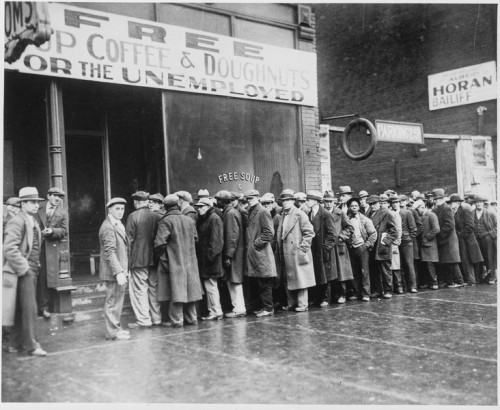
January was the winter of our discontented stock market. It was the worst January since 2008, when the Great Recession began. It was, in fact, the worst January in the history of the New York Stock Exchange. According to Citigroup, Inc., it was also the worst January ever for credit markets.
A financial professor at NYU agrees with Citigroup on that:
Altman said the correlation among stocks, bonds and energy prices has never been higher, meaning that when stock markets move, the spillover to bonds and energy prices is even more powerful. That hasn’t happened before, he said.
“I didn’t expect things to change this quickly in the last month,” Altman said. “Last Friday, we had a swing by one percent, and we almost never see a one-percent swing in a day in the fixed-income markets. It shows a huge amount of volatility.”
“Crises in the credit markets will trigger economic recessions,” Altman said. “We don’t need a 10 percent default rate to have a recession. I am not saying we will definitely go into recession, but it’s fair to say the likelihood of recession in the U.S. is much higher than just three months ago.” (“NYU’s Altman Says US Defaults to Climb, Recession More Likely“)
Some people thought that a January like this is unpredictable. That’s odd to me because I was certain it was inevitable. Now we have people — perhaps the same ones — who say this January is hardly a harbinger of a recession — that it is nothing like the Great Recession when we had massive bank failures. Oh, silly little kings of mental ineptitude! January 2008 did not have any bank failures or major events either. The first failures didn’t happen until six months later! This January, in fact, looks far worse than the January when the Great Recession began.
How soon they forget that Bear Stearns didn’t crash until the summer of ’08. How soon they forget that, in January of 2008, none of them believed we had just entered a recession because recessions are never officially declared until we have had two consecutive quarters of GDP contraction. (Let’s not even bother with calling it negative “growth.” It’s simply decline.) Then they are declared to have begun in the first month of the first of those quarters. How soon they forget that, just days before Bear Stearns collapsed and before the second quarter of GDP shrinkage was known, Ben Burn-the-Banky declared there was no recession in sight.
That explains why they think stock market crashes like the one we have been in all month are not predictable and that recessions are not predictable. Because they can’t even see a recession when they are months into it, they believe no one else can. Surely no one can be smarter than the central planners of the US economy! Never mind that some people, like those in The Big Short or like myself, said in 2007 that a complete global financial meltdown was going to happen in 2008.
The nation’s financial gurus, who turn in unison like a murmur of starlings, thought those people didn’t know a thing back then. They laughed at them … and then lost a fortune to them. Afterwards, they were certain those people who saw it coming and protected themselves from it or set themselves up to profit from it were just lucky. No one can be smarter than our central planners. Now, as history repeats itself, our pedigreed designers of economic deconstruction say again, “Well, lucky guess about that whole stock market crash thing this month.”
In spite of the fact that they don’t think recessions are predictable, I’ve read a few of them recently who don’t hesitate to make their own prognostication that the present market drop is not going to become the kind of all-out crash that goes along with a recession because one key essential for such recessionary crashes is missing — “irrational exuberance” by investors.
If that’s what they needed to believe this crash is one of the big ones, then last week should have put that requisite criteria to rest.
The Broken FANG
I am writing to assure you this bitter January is a harbinger of global economic collapse. Let me make it repeatedly clear that this is far more than a stock market crash. We have entered the Epocalypse. We are standing in the dragon’s mouth as it dives into the abyss. Leaning against the dragon’s teeth, our central planners and gabby gurus look out at the spinning world around us and assure us they see no sign of anything that looks like a dragon; and, though the world appears to be spinning, it does not mean we are falling.
“Not all bad January’s are harbingers of bad years,” they have been saying, and that is true; but this one is. The prophets of false comfort will tell you that forty percent of the time a bad January in the stock market winds up turning into a good year for stocks. It’s only about sixty percent of the time that the rest of the year matches the first bad month. True enough. However, when you consider that the number of years when the stock market goes down for the whole year are a lot less frequent than the ones where it goes up, a 60% match of bad years to bad January’s is well above the odds for correlation.
As one who is not interested in tickling your ears with half truths, let me just tell you that this January is one of the sixty percent where the year will match, and I’ll tell you why for reasons that have nothing to do with statistical averages or old-analysts’ tales of the New York exchange.
I will even turn to the preachers of non-recession for my argument. They say the permabulls must start buying the market up euphorically when it makes little sense to do so in order for a crash to become recessionary. When the bulls start trying to rally over nothing, you know they are desperate. A supporting sign is when every rally fails to hold.
Well, that is exactly what the stock market looked like through all of January but especially last week. What we see saw at the end of last week was that the bulls moved from being rosy-eyed with optimism to being rosy-eyed with inebriation. Their actions were beyond unduly optimistic in that they are now crowding into a smaller and smaller bull pen. In 2015, the bull pen consisted of only ten corporations on the New York Stock Exchange that were keeping the major indexes — like the Dow, the S&P 500 and Nasdaq — in positive territory. Mainly there were four– the “FANG” stocks, Facebook, Amazon, Netflix, and Google — keeping the market positive.
The bulls lost one of the top-ten part way through last year when Apple (AAPL) started to decline, bringing the bull pen down to nine stocks that could be counted on for bullish survival. Thursday of last week, they lost one of the FANG (FB, AMZN, NFLX, GOOGL) stocks — the top four. Amazon came in with horrible earnings for 2015, so its stock tanked. (Apple came in worse, too, with iPad sales down 25%.) Amazon’s founder and CEO, Jeff Bezos lost $8 billion of his personal paper wealth overnight. Both Amazon and Apple also have poor outlooks ahead. Apple has been sliding rapidly downhill for several months, practically stumbling over a cliff at some points.
Any fool should have known the FANG stocks had to crumble soon. With an average price-earnings ratio well above 100x, they were all grotesquely overpriced due to market crowding into the best performers. Now, a market that was already crowded at the top has twenty percent less space to squeeze into in terms of the number of companies that are still rising. The bulls are running into a narrowing chute. And when bulls run into a chute, that chute usually goes into a truck headed for the slaughter house.
While some of the leading corporations in the US stock market took the worst hits, the majority of businesses that reported last week missed expectations and lowered their outlooks for 2016. Having exhausted years of the most massive economic stimulus in world history, all we have to show for it is corporations all across the industrial spectrum that are in decline … and the greatest mountains of debt ever known to mankind. Yet, the market soared on Friday
Bullheaded Behavior
Let’s test the rationality of the bull’s behavior last week to see if crowding into a rapidly narrowing chute of safe stocks is “irrational exuberance.”
We left the world where bad economic news was received as good news back in December when the Federal Reserve crossed the point of no return and made its decision to end all visible stock-market stimulus. That left no more reason to think bad economic news meant the Fed might hold off on ending stimulus. That calculus should have been removed from the algorithms of robotraders and real traders because the decision is behind us now. If the Fed did go back, it would only mean everything they did failed. Repeating the same “solution” and expecting different results would fit the definition of insanity. So, market investors would have to be insane to think that the Fed’s returning to stimulus programs is cause to celebrate.
There was actually some solid economic sense to that upside-down world when the Fed was still looking forward to ending its stimulus. That sense was this: the central bank was by far the biggest player in the game when it was giving away virtually infinite amounts of free fiat money (money that is simply declared into existence with a couple of keyboard clicks). No other economic news could compare to those moves. So, what mattered more than anything to the market was how many tens of billions of new dollars were going to get dumped into the casino for free play every month.
Think of it this way: if your mama told you as a child that every time you skinned your knee by falling on the sidewalk (bad news), she’d give you a thousand dollars as a balm to the pain (good news), you’d probably go out and skin your knee on the sidewalk on purpose just to get another thousand dollars. Bad news would be received as good news — big rewards for small pains. Accidentally skinning your knee again would become a cause to celebrate. Then the day comes when your mama says there will be no more hope of the thousand-dollar balm. From that point on, a skinned knee will go back to being just bad news that hurts, and your enthusiasm for skinned knees should change instantly.












Leave A Comment